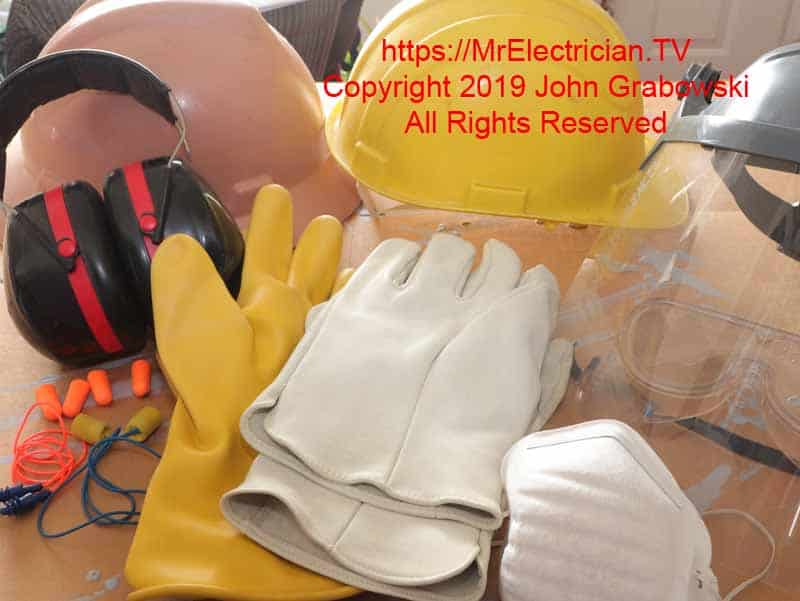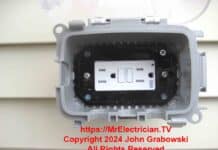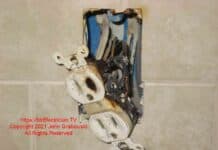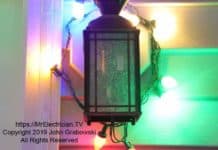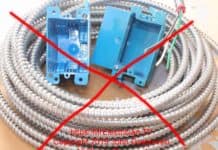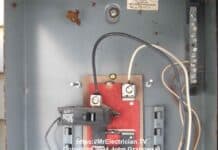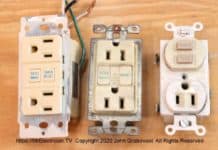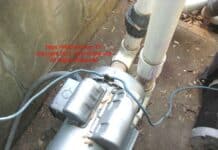Dear Mr. Electrician: How to be safe when working around your home? My wife and I recently purchased our first house. It needs some work, and we want to do as much of it as possible ourselves, but we want to do things with safety in mind.
Answer: Knowing how to be safe when working around your home requires planning.
NOTE: Text links below go to applicable products on Amazon. As an Amazon Associate, I earn from qualifying purchases. Using my links helps to keep this website FREE.
All your home remodeling projects should be carefully planned beforehand so that the tools and materials needed are there when you start the job. Safety should be included in the planning process.
If you have no experience working on a house and no one to guide you, I would say tread lightly. It takes a certain amount of mechanical aptitude, knowledge, and experience to safely work on a house successfully. You also need the proper tools.
Below are some of my tips on how to be safe when working around your home. They are generalized, and some work situations will require additional safety precautions. For specialized safety requirements, you should read OSHA 1926 safety regulations.
If you read this around the holidays, you should also read my post about holiday safety tips.
Safety should be the first consideration when doing any job around the home. Professional tradespeople know and perhaps have training in how to be safe. Some of that knowledge is derived from actual experiences with getting hurt.
I have an OSHA 30-hour safety card, meaning that I went through OSHA’s approved construction safety training. However, I do not consider myself a safety expert.
I am constantly aware of unsafe workplace practices and conditions, but that doesn’t mean accidents won’t happen. You must get into a mindset of thinking about and including safety when planning to do work around the house. Avoid unsafe shortcuts. Read my list below.
SAFE PRACTICES WHEN WORKING
Use a stepladder when working on the ceiling. Do not stand on a pail, a chair, a countertop, a stack of milk crates, or the tub and toilet to perform work. One bad fall can change your life forever.
I know that many households have step stools for daily use. I do not recommend using a step stool when working around your home. A five-foot ladder or taller should be used. Taller ladders for higher ceilings. Check the weight rating of a ladder before you purchase it.
A metal ladder should not be used when working around live electrical wires.
Shut off the power at the circuit breaker when working on electrical circuits and appliances. In a normal situation, shutting off the wall switch may suffice, but you won’t know if the light fixture or appliance was wired correctly and safely until you work on it. Even with the circuit breaker off, current can flow on the neutral conductor because it is shared on a multi-wire circuit or the wiring is incorrect.
Always test the wires before working on them. A non-contact voltage tester will work in many cases to tell you if the LINE conductor is live or not. However, it will not tell you one way or the other if there is neutral current flowing.
If you know what to look for, a voltmeter or a pigtail socket with an incandescent or halogen lightbulb can tell if a neutral current is flowing.
The safest thing to do is to shut the power off to the entire house using the main circuit breaker in your electrical panel. However, even with the main breaker being off, there is still a rare possibility that neutral current could still be flowing through your main electrical panel and grounding electrode connection.
It is inconvenient to shut power off to the entire house, but it is better than getting electrocuted. Please note that I do not recommend that a novice work on electrical wiring. The potential for creating a shock hazard or starting a fire is too great. Some electrical problems that amateurs create don’t show up for months or years.
To find out what happens when your body comes in direct contact with electricity, click here.
Keep the workspace clear of debris. It can be a tripping hazard having to step over things while trying to get work done. Take a few minutes to clean the work area. It will be safer and more productive.
When I was younger, I stepped on a nail in a board lying on the construction site. Fortunately, I only needed to get a hypodermic shot. My father told me when he was younger and stepped on a nail. The doctor had to go in the hole in his foot to clean it out, which hurt worse than the original nail penetration.
I wear the top-of-line Red Wing work boots with steel toe protection and protection from nail penetration.
Wear a dust mask or respirator to avoid breathing anything nasty. Protecting your head and hair from dust particles is not a bad idea. Upon completion of the work, remove your clothes and take a shower.
When working with nasty-smelling household cleaning liquids, paints, or other chemicals, wearing the proper respirator is essential, especially in confined spaces such as bathrooms and closets. Open the windows. Run some fans to move the air out. Take lots of breaks outside in the fresh air.
Wearing eye protection is another way to be safe when working around your home. It is very easy for something to get thrown into your eyes and cause permanent damage. Goggles are good for eye protection when doing some things. Face shields protect your whole face.
I have seen some construction workers wear goggles and a face shield at the same time. Protect your eyes.
Use hearing protection when working around loud noises or using loud tools and equipment. Many of us cut our lawns. It would be best if you used hearing protection when doing that with a gasoline-powered mower. Leafblowers also make a lot of noise.
You should not wear earphones or headphones and listen to music while doing construction work. You cannot hear danger if music is playing in your ears. Much to the annoyance of co-workers and employees, I prefer no radios at my jobs.
Wear work shoes. I realize that most of you do not own a pair of high-back steel-toe work shoes as I do, but your feet can get injured when working. Going up and down a ladder is painful for someone who does not work like this regularly. Protect your feet when working around the house. Do not work barefoot!
Wear gloves to protect your hands from scratches and callouses. When working around live electricity, you should use electrically insulated gloves with glove protectors. An arc-flash rated face shield is also important to protect your eyes from an electrical explosion.
A hard hat is important if you work where something can fall on your head. Bump caps are available for working with the possibility of bumping your head, such as attics or crawl spaces.
When using an electric-powered tool, always plug it into a Ground Fault Circuit Interrupter (GFCI). This is especially important when working outdoors, in the basement, around water and water pipes, or in the garage.
The concrete floor in a basement or garage is a good electrical ground path. If you were to come in contact with a live wire and another part of your body was in contact with concrete, you would get a shock or be electrocuted. Another reason why wearing safety work shoes is a good way to be safe when working around your home.
See my portable GFCI outlet box for use in construction in the photo below.
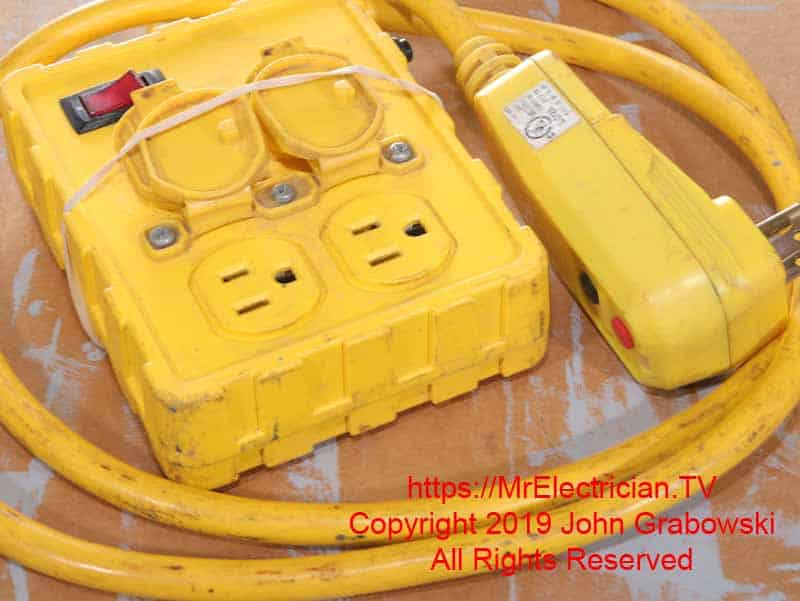
If you must go on the roof, use fall protection and have at least one other person standing by for emergency assistance. Study the use and operation of fall protection, such as harnesses and safety ropes, before you go up on the roof. If left hanging in a harness for over a few minutes, permanent injury or death can occur. You must have an escape plan in place before working on the roof.
From the OSHA website (OSHA.gov): “For construction operations, fall protection generally must be used at heights of six feet or greater. Falls are the leading cause of death in the construction industry.
Fall protection can be accomplished through guardrail, safety net, or personal fall arrest systems. Certain work site activities and/or locations may allow other methods (including, but not limited to, positioning device systems, warning line systems, and controlled access zones) to be used.”
Jewelry must not be worn when working around the home. A ring can get caught on a power tool or a machine and rip your finger off. Necklaces can also get caught on something and choke you. Remove watches, rings, earrings, bracelets, necklaces, neckties, and anything else that can catch on a tool or a machine.
Electricians who wear jewelry are especially prone to accidents. Jewelry is a good conductor of electricity and can cause severe burns and sparks when in contact with live wiring.
You should also be careful with clothes that have dangling cords or pull strings, such as those on hoodies. Tuck the loose ends so they are not apt to get caught on something.
If you have long hair, tie it up out of the way. After graduating high school, I worked as an electrician’s helper for my father’s electrical contracting company that summer. I had long hair and was drilling holes with an angle drill above my head.
Suddenly, my hair got caught on the drill chuck and ripped a patch the size of my hand from my scalp. Fortunately, I could react immediately and stopped using the drill, which was now pulled into my head. After that, I cut my hair shorter and wore a headband to hide the bald spot until my hair grew back.
Call 811 before digging a trench or driving a ground rod. They will arrange for a utility markdown of your property. When digging, you don’t want to cut into a water pipe, electric power line, telephone line, cable TV service, or gas pipe.
Although the underground utilities are identified after the markdown, there are still items that will not be identified that can cause you problems, such as oil tanks, septic systems, lawn and garden irrigation systems, sump pump drains, and landscape lighting wiring.
Look around the property for signs of other things that may be buried. Check the basement or crawl space to see if pipes or wires exit the house toward your trench. Look around the perimeter of the foundation to see if any pipes or cables are going into the ground.
Wash your hands. I always bring hand wipes on the job. After going in dusty old attics or moldy basements, I don’t want to catch some rare illness. Sometimes, cutting holes in ceilings and walls reveals evidence of rodents. Wear a face mask or respirator mask.
Have some ice packs available for when you are finished working. Apply one to the back of your neck, as that will be a sore spot due to looking up for a long time. This is part of my nightly routine. Your hands and knees will probably hurt, too.
Visit my blog post depicting various naughty electrical code and safety violations. Be safe when working around your home.
To help keep this website FREE, please use this Amazon link for your purchases. As an Amazon Associate, I earn from qualifying purchases.
Click for a FREE copy of my book “Almost Everything You Need To Know To Repair a Bathroom Exhaust Fan In Your Home.”
Get your required “Emergency Disconnect, Service Disconnect” labels and stickers to satisfy the 2023 National Electrical Code requirements in article 230.85(E)(1) and (2) by going to my Redbubble Shop here.
Visit my Link Tree home page for my social media connections and other links.
